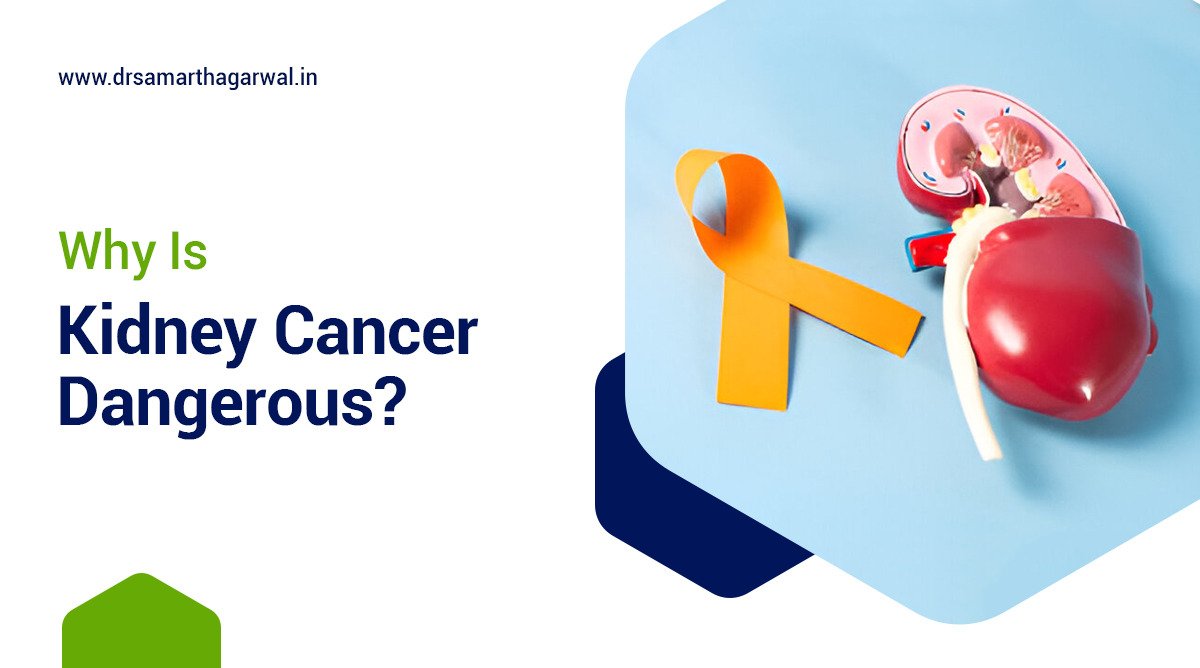Kidney cancer is a disease with significant health risks that many people may not be aware of. It is crucial to understand the various types of kidney cancer and the aggressive nature of the disease for early detection and treatment. This article will explore the risk factors associated with kidney cancer, the common symptoms of the disease, and the available treatment options, including both surgical and non-surgical procedures. Additionally, it will outline prevention strategies and healthy habits that can help reduce the risk of developing kidney cancer.
According to the World Cancer Research Fund, kidney cancer is the 14th most common cancer worldwide, and in India, it ranks as the 10th most common cancer in men and the 13th in women 2. In 2022, India had one of the highest numbers of deaths from kidney cancer globally, alongside China and the US.
What is kidney cancer?
Kidney cancer is a disease where malignant cells form in the tissues of the kidney. The most common type of this cancer is renal cell carcinoma, which is known for being particularly aggressive. Early detection—often through imaging tests, blood tests, urine tests, and biopsies—is key, as it can significantly improve the chances of successful treatment and survival. Because kidney cancer impacts patients’ overall health and quality of life, a comprehensive approach involving a multidisciplinary healthcare team and effective patient support systems is critical in managing the disease.
Types of Kidney Cancer
The most common type of kidney cancer is renal cell carcinoma, which accounts for more than 80% of cases. This type of kidney cancer begins in the lining of the renal tubules and includes several subtypes, such as clear cell, papillary, and chromophobe carcinoma, each exhibiting distinct histological and biological characteristics.
Clear cell carcinoma is the predominant subtype and is often recognized for its clear appearance under the microscope, which is due to the presence of lipids and carbohydrates.
Tumor grading in renal cell carcinoma serves as an important prognostic indicator, as higher grades are linked to more aggressive tumor behavior and a poorer prognosis.
While there are other less common types, such as transitional cell carcinoma and Wilms’ tumor, renal cell carcinoma is the most significant type to discuss.
Why is Kidney Cancer Dangerous?
Kidney cancer poses significant risks to patients due to its potential to spread to other organs, varying survival rates based on cancer stage, and its detrimental effects on kidney function and overall health.
The prognosis for patients with kidney cancer can deteriorate considerably as the cancer progresses from stage 1 to stage 4, highlighting the importance of early diagnosis and treatment.
Healthcare professionals often address these issues by evaluating the performance status of their patients to effectively manage their treatment. This emphasizes the need to recognize the aggressive nature of kidney cancer and its impact on patients.
- Uncontrolled Cell Growth: Kidney cancer, also known as renal cancer, is dangerous because it involves the uncontrolled growth of cells in the kidneys, leading to the formation of tumors. This can disrupt the normal function of the kidneys.
- High Mortality Rate: The mortality rate for kidney cancer can be significant, especially in advanced stages. According to the Indian Cancer Society, the mortality rate from kidney cancer in India is significant. In 2020, nearly 850,000 people died due to cancer in India, with kidney cancer contributing to this number. The age-standardized mortality rate (ASMR) for cancer in India is 63.1 per 100,000, which is approximately half of the global ASMR.
- Late Detection: Kidney cancer often does not cause symptoms in its early stages, leading to late detection. Symptoms like blood in the urine, flank pain, and a lump or mass may only appear when the cancer is more advanced, making it harder to treat.
- Risk of Metastasis: Kidney cancer has a high potential to spread to other parts of the body, such as the lungs, bones, and brain. This metastasis can lead to severe complications and a poorer prognosis.
- Impact on Kidney Function: As the cancer grows, it can impair the kidney’s ability to filter blood and remove waste, leading to kidney failure and other systemic health issues.
- Associated Health Risks: Kidney cancer is linked to several risk factors that can exacerbate its danger, including smoking, obesity, high blood pressure, and exposure to certain chemicals. These factors not only increase the likelihood of developing kidney cancer but can also complicate treatment and recovery.
- Genetic Predisposition: A family history of kidney cancer or certain genetic syndromes can increase the risk, making it more dangerous for individuals with these predispositions.
- Severe Symptoms: Advanced kidney cancer can cause severe symptoms such as bone pain from metastases, anemia, weight loss, and fever, which significantly impact the quality of life and can be life-threatening.
- Treatment Challenges: Treating kidney cancer, especially in advanced stages, can be challenging. Surgery, chemotherapy, and radiation therapy may be necessary, but these treatments can have significant side effects and may not always be curative.
- Increasing Incidence: The incidence of kidney cancer is increasing, which means more people are at risk of developing this dangerous condition. This trend underscores the importance of awareness and early detection.
Risk Factors for Kidney Cancer
Several risk factors contribute to the incidence of kidney cancer in India. These include:
- General Risk Factors: Age, gender, and certain medical conditions like chronic kidney disease and kidney stones.
- Genetics: A family history of kidney cancer increases the risk.
- Lifestyle: Obesity, smoking, and exposure to certain chemicals are significant lifestyle factors.
In India, the young population (below 50 years of age) is often diagnosed with advanced-stage kidney cancer, which differs from the age distribution seen in other countries.
Detecting Kidney Cancer
The early diagnosis of kidney cancer is crucial for improving treatment outcomes.
The diagnostic process includes imaging tests, blood tests, urine tests, and biopsies. Healthcare professionals play a vital role in guiding the use of these diagnostic methods by recognizing the signs and symptoms of the disease.
Common Symptoms and Diagnostic Techniques
The most common symptoms of kidney cancer include blood in the urine, persistent back pain, and unexplained weight loss, which often lead to the use of imaging tests, blood tests, urine tests, and biopsies for diagnosis.
These symptoms frequently serve as the initial indicators that something may be wrong, prompting individuals to seek medical evaluation.
When a doctor suspects kidney cancer, imaging tests such as CT scans or MRIs are employed to examine the kidneys and surrounding tissues. These tests help determine the size and location of any tumors.
Blood tests can reveal abnormal kidney function or increased levels of certain substances, while urine tests may detect cancerous cells or provide additional evidence of a tumor’s presence.
In some cases, a biopsy is necessary to confirm the diagnosis, offering definitive information about the type of cancer and guiding treatment options. Each diagnostic method plays a crucial role in achieving a comprehensive understanding of the patient’s condition.
Treating Kidney Cancer
The treatment of kidney cancer encompasses various options, including surgery, chemotherapy, immunotherapy, and targeted therapy.
- Nephrectomy: A surgical procedure that removes the affected kidney to eliminate cancerous tissue; it can be performed partially to excise only the tumor or radically to remove the entire kidney and surrounding tissues when necessary.
- Cryoablation: A minimally invasive treatment that uses extreme cold to destroy cancer cells, offering an effective option for patients who may not tolerate surgery well.
- Radiofrequency Ablation: A non-surgical method that employs heat generated by radiofrequency energy to kill small tumors, making it a viable alternative for patients ineligible for surgery.
- Targeted Therapies: Medications that interfere with molecular pathways and proteins critical for tumor growth, thereby helping to slow or stop the progression of kidney cancer.
Preventing Kidney Cancer
Preventing kidney cancer involves making healthy lifestyle choices, understanding the contributing factors, and following regular screening recommendations based on the latest kidney cancer research.
Healthy Habits and Screening Recommendations
Adopting healthy habits such as maintaining a balanced diet, engaging in regular physical activity, quitting tobacco use, and adhering to routine screening recommendations can significantly reduce the risk of kidney cancer.
Staying hydrated is equally important, as it helps prevent kidney stones and urinary tract infections, which contribute to improved kidney function and overall health.
A diet rich in fruits and vegetables provides essential nutrients and antioxidants that may help inhibit the development of cancer cells. Additionally, maintaining a healthy weight and managing blood pressure through a low-sodium diet are crucial preventive measures.
Individuals with a family history of kidney cancer should consider genetic counseling and discuss personalized screening options with their healthcare provider. Routine urine tests and imaging studies can play a vital role in detecting early signs of kidney cancer.

Contact Dr. Samarth Agarwal if you have any questions or concerns about kidney cancer!




